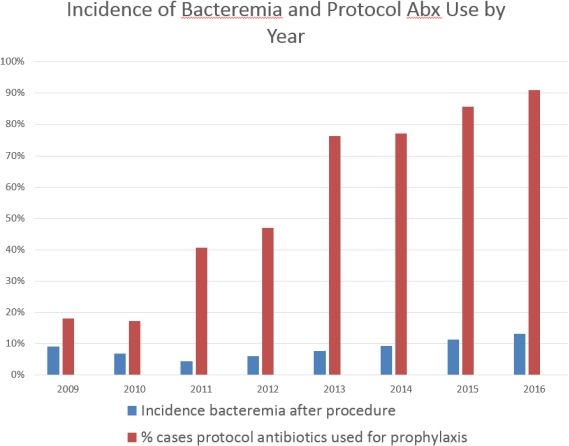Bacterial Complications in Liver Transplant Recipients Undergoing Biliary Tract Manipulation: Effect of an Antibiotic Prophylaxis Protocol
University of Massachusetts Medical School, Worcester, MA.
Meeting: 2018 American Transplant Congress
Abstract number: C337
Keywords: Bacterial infection, Liver transplantation
Session Information
Session Name: Poster Session C: Transplant Infectious Diseases
Session Type: Poster Session
Date: Monday, June 4, 2018
Session Time: 6:00pm-7:00pm
 Presentation Time: 6:00pm-7:00pm
Presentation Time: 6:00pm-7:00pm
Location: Hall 4EF
Purpose: The purpose of this study was to evaluate incidence of bacteremia and outcomes in liver transplant recipients that had biliary tract manipulation before and after the institution of an antibiotic prophylaxis protocol in January 2013.
Methods: Data was collected by retrospective medical record review after IRB approval. Likelihood ratio, binary logistic model and Wald chi-square were performed using SAS statistical software.
Results: Patient demographics are shown in Figure 1.  Women were almost 60% (OR=0.386, 95%CI[0.169-0.894]) less likely to have bacteremia. Patients who did not receive prophylaxis per protocol were 59% (OR=1.594,95%CI[0.632-4.025], non-significant) more likely to have bacteremia. Odds of bacteremia increased by 22% (OR=1.22, 95%CI[1.008-1.476]) per year after 2009 and increased by 2.2% (OR=1.022, 95%CI[1.008-1.037]) for each unit increase in MELD score. The use of antibiotics for prophylaxis increased after the protocol was instituted but the incidence of bacteremia did not statistically significantly decrease.
Women were almost 60% (OR=0.386, 95%CI[0.169-0.894]) less likely to have bacteremia. Patients who did not receive prophylaxis per protocol were 59% (OR=1.594,95%CI[0.632-4.025], non-significant) more likely to have bacteremia. Odds of bacteremia increased by 22% (OR=1.22, 95%CI[1.008-1.476]) per year after 2009 and increased by 2.2% (OR=1.022, 95%CI[1.008-1.037]) for each unit increase in MELD score. The use of antibiotics for prophylaxis increased after the protocol was instituted but the incidence of bacteremia did not statistically significantly decrease.
| Incidence Bacteremia within 7 d | LR | |
| Pre vs Post protocol | 6.2% vs 8.2% | 0.42 |
| Pre protocol; received appropriate abx vs not | 1.8% vs 6.9% | 0.13 |
| Post protocol; received appropriate abx vs not | 7.3% vs14.6% | 0.15 |
Conclusions: Use of antibiotic prophylaxis prior to biliary manipulation increased after the prophylaxis protocol was initiated. There was a non-statistically significant trend toward lower risk of bacteremia when antibiotics were used according to the prophylaxis protocol. Enterococcus, especially VRE, was the most common pathogen causing bacteremia, even when prophylaxis was used.
CITATION INFORMATION: Clifford C., Theodoropoulos N., Daly J., Gibson L., Mehta S., Malik H., Bozorgzadeh A. Bacterial Complications in Liver Transplant Recipients Undergoing Biliary Tract Manipulation: Effect of an Antibiotic Prophylaxis Protocol Am J Transplant. 2017;17 (suppl 3).
To cite this abstract in AMA style:
Clifford C, Theodoropoulos N, Daly J, Gibson L, Mehta S, Malik H, Bozorgzadeh A. Bacterial Complications in Liver Transplant Recipients Undergoing Biliary Tract Manipulation: Effect of an Antibiotic Prophylaxis Protocol [abstract]. https://atcmeetingabstracts.com/abstract/bacterial-complications-in-liver-transplant-recipients-undergoing-biliary-tract-manipulation-effect-of-an-antibiotic-prophylaxis-protocol/. Accessed February 19, 2026.« Back to 2018 American Transplant Congress

